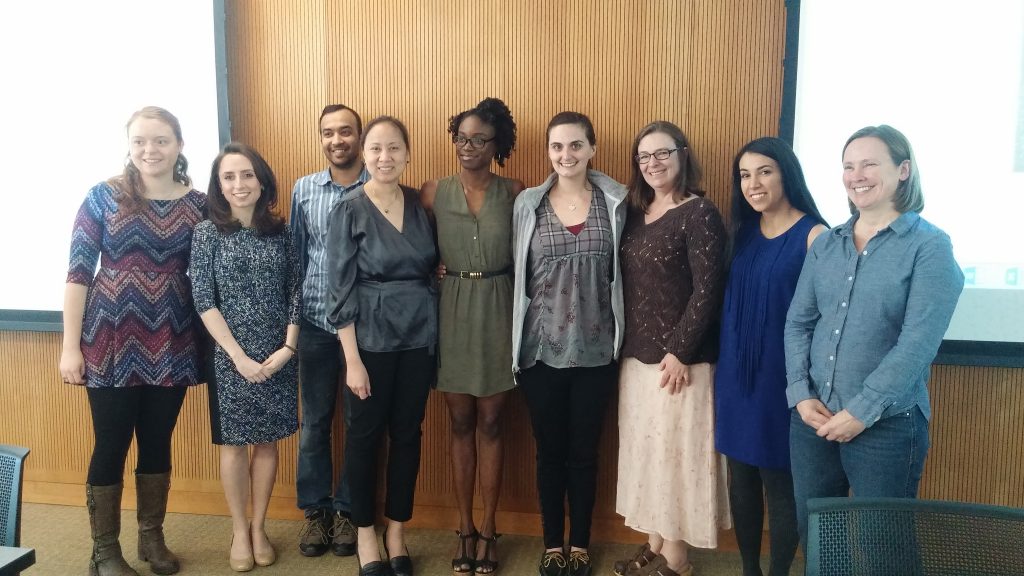Evaluating sexual violence prevention programs for a state health department. Identifying soldiers with PTSD and depression for the U.S. military. Surveilling alcohol and drug use for one of the largest U.S. city health departments.
Since graduating from the UI College of Public Health last year, this is how three of our UI IPRC alumni are working to prevent injuries and violence in the real world.

Lizzy Mello, MS, Epidemiology 2016
As an Alcohol and Drug Epidemiologist for the New York City Department of Health’s Bureau of Alcohol and Drug Use Prevention, Care and Treatment, Mello uses hospitalization, prescription monitor, and survey data to answer questions like who is using drugs and alcohol and how the population is changing from year to year. She also responds to requests for statistics from the media or other city agencies, and prepares written materials for the public.
“The drug overdose epidemic is progressing and changing so rapidly that we are always updating data. We base all our work on what the most recent data is telling us and what the trends look like,” she said. “We try to get information out as quickly as we can, without sacrificing data quality.”
Mello said her bureau is working tirelessly to respond to the rise in drug overdoses—primarily due to opioids — and the NYC government leadership has taken a strong interest on this issue.
“Many people are effected by drug use, and that motivates me every day. Plus, when the mayor uses the statistics you and your coworkers produced to launch a major policy initiative, it is rewarding,” Mello said.
At the UI IPRC, Mello said she gained experience designing, executing, and analyzing research—all far more practical than any textbook.
“I learned how research operated in the real world and how to talk about it to real people, two things that I rely on daily.”
Maisha Toussaint, PhD, Epidemiology 2016
During her PhD program, Toussaint worked with large datasets to study violence in youth workers and youth offenders. Now, as a Senior Epidemiologist at the Defense Health Agency, she brings her methodological and analytical skills to improve the health and combat readiness of U.S. military personnel.
“I was able to transfer this skill set to my current position where I frequently work with relational databases consisting of approximately one million observations,” she said.
Toussaint is designing an evaluation on how physical training impacts unintentional injuries in active-duty soldiers during pregnancy and post postpartum. She is also reviewing data and processes used to identify soldiers who have symptoms of posttraumatic stress disorder (PTSD), depression and alcohol use.
“Determining the time and frequency at which they are seeking treatment has major implications on addressing the burden of and access to mental health facilities across army installations,” Toussaint said.
At the UI IPRC, Toussaint said she had numerous opportunities to lead and assist with research projects, so she now she is able to execute every step of the research process from project design to dissemination of results. Her time spent working on interdisciplinary projects helps her today, she said.
“I am able to communicate and collaborate with psychologists, exercise physiologists, and therapists more efficiently.”
Leah Wentworth, PhD, Occupational and Environmental Health/ Occupational Injury Fellow, 2016
Wentworth works as a Research and Evaluation Manager on the New York State Department of Health’s Sexual Violence Prevention Program. She is an evaluator of the New York State Rape Prevention and Education (RPE) Program and is the intimate partner violence and sexual violence lead for the state’s injury prevention grant funded by the Centers for Disease Control and Prevention (CDC).
“I love that I get to work in both research and practice,” Wentworth said, “On any given day, I might be helping our partners in the field think about how to engage with new community members or agencies—or editing a survey to assess gender norms among teenage boys. I’m pretty lucky!”
Wentworth said the research on sexual violence prevention has mostly focused on individual-level interventions, especially bystander training programs. However, the RPE program emphasizes community change strategies, she said, like coalition building and policy change.
“During this funding cycle, we’re all expanding our evaluation capacity to better understand how this shift in programming is shifting outcomes,” she said. ” It’s an exciting time to be learning while we’re doing!”
Through her PhD program, Wentworth said she got better at thinking through a research or practice problem analytically, and applied those skills assisting with an evaluation of a campus-wide suicide prevention program.
“It was great preparation for my current role. I came to this job, and hit the ground running.”
See other alumni highlights on our Careers in Injury & Violence Prevention page.




